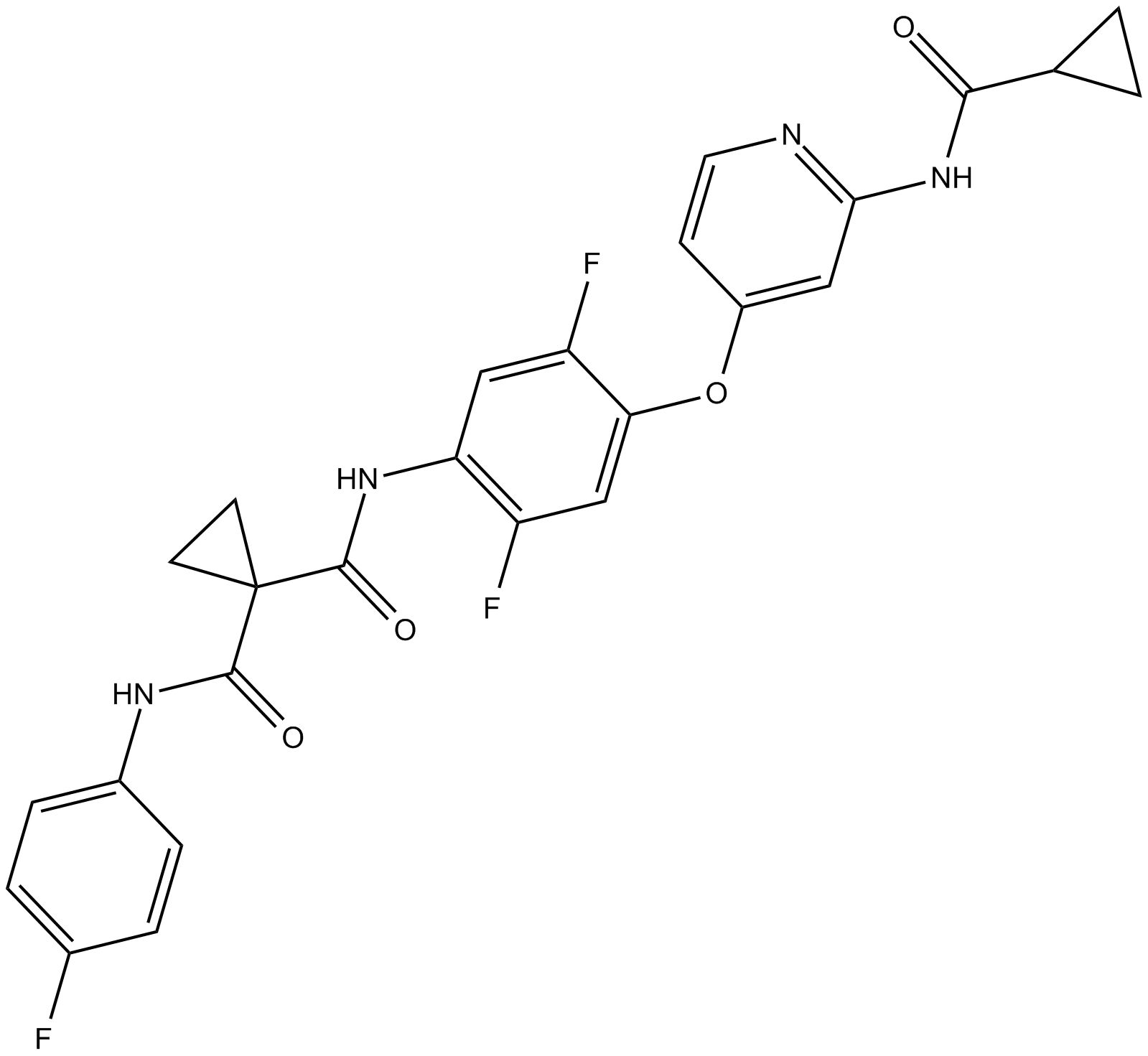Altiratinib (Synonyms: DCC-2701) |
| Catalog No.GC16604 |
L'altiratinib (DCC-2701) est un inhibiteur de kinase À cibles multiples avec des IC50 de 2,7, 8, 9,2, 9,3, 0,85, 4,6, 0,83 nM pour MET, TIE2, VEGFR2, FLT3, Trk1, Trk2 et Trk3 respectivement.
Products are for research use only. Not for human use. We do not sell to patients.

Cas No.: 1345847-93-9
Sample solution is provided at 25 µL, 10mM.
Altiratinib (DCC-2701) is a potent inhibitor of c-MET/TIE-2/VEGFR with IC50 values of 2.7, 8.0 and 9.2 nM, respectively [1].
Hepatocyte growth factor receptor (c-MET) is a tyrosine kinase receptor for hepatocyte growth factor and is essential for wound healing and embryonic development. TEK tyrosine kinase (TIE-2) is a receptor for angiopoietin-1 (ANG-1) and is important for endothelial cell-smooth muscle cell communication. VEGFR is a tyrosine kinase receptor for vascular endothelial growth factor that involved in both vasculogenesis and angiogenesis.
Altiratinib (DCC-2701) is a potent c-MET/TIE-2/VEGFR inhibitor. Altiratinib potently inhibited MET kinase and activating oncogenic MET mutations and also inhibited TRKA, TRKB and TRKC kinases with IC50 values of 0.85, 4.6, and 0.83 nM, respectively. In EBC-1 NSCLC and MKN-45 gastric cancer cell lines overexpressing MET, altiratinib inhibited MET phosphorylation with IC50 values of 0.85 and 2.2 nM, respectively. In VEGF-stimulated HUVECs, altiratinib inhibited VEGFR2 phosphorylation with IC50 value of 4.7 nM. In HUVECs and EA.hy926 cells, altiratinib inhibited TIE2 phosphorylation stimulated by ANG-1 with IC50 values of 1.0 and 2.6 nM, respectively [1].
In the MET-amplified MKN-45 xenograft model, altiratinib (30 mg/kg) inhibited MET phosphorylation by >95% for the 24-hour period [1]. In nude mouse xenografted SKOV3 cells, DCC-2701 (10 or 20 mg/kg for 28 days) significantly reduced tumor burden by 53% and 52%, respectively [2].
References:
[1]. Smith BD, Kaufman MD, Leary CB, et al. Altiratinib Inhibits Tumor Growth, Invasion, Angiogenesis, and Microenvironment-Mediated Drug Resistance via Balanced Inhibition of MET, TIE2, and VEGFR2. Mol Cancer Ther, 2015.
[2]. Kwon Y, Smith BD, Zhou Y, et al. Effective inhibition of c-MET-mediated signaling, growth and migration of ovarian cancer cells is influenced by the ovarian tissue microenvironment. Oncogene, 2015, 34(2): 144-153.
Average Rating: 5 (Based on Reviews and 31 reference(s) in Google Scholar.)
GLPBIO products are for RESEARCH USE ONLY. Please make sure your review or question is research based.
Required fields are marked with *




















